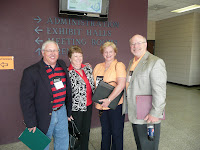How much attention in the worship service should you give to civic occasions, such as Veterans Day? It's a small issue that floats on top of the church/state cauldron. Jesus neatly side-stepped the issue in his day with his well-known "give Caesar's stuff to him, and God's stuff to God" response. But he was an itinerant preacher who moved right on, whereas we are in the midst of our people, answering to them, at least until the Bishop deems otherwise.
So, do you observe closely the divide Jesus delineated? Do you give only God's stuff to God in church, and keep the state's stuff out? If so, you might be like my friend, Rev. Clayton
Childers, who says we shouldn't even display the US flag in the church - its presence gives the appearance that the church condones American policies that are in opposition to the values Jesus taught. That's probably an expected stance for someone like Clayton who works for the Board of Church and Society.
Do you cringe when everyone stands for a prayer before a football game? Do you look for a calendar conflict when asked to give the invocation at a political gathering? Do you agree with a Bishop we once had who said the church should not observe Mother's Day? Do you eschew singing "My Country
Tis of Thee" or "America" in a worship service? Then you might just be a Methodist of the reformed tradition - in everything be clear that our allegiance is to God alone. Disavow the public prayers that give a "nod to god" while basically ignoring his commandments. Keep alert to sniff out such occasions of civic religion, and lead your flock in devotion to the God who stands above all kingdoms and powers and rulers.
And yet, we are pressed upon as pastors to fulfill the role of civic clerics. We are asked to bring a divine blessing to events that have little or nothing to do with the God we serve. We straddle the awkwardness of honoring the veterans who have served us, while not glorifying war. We field the sincere pleas of church members who want a good 'ole flag waving patriotic worship service like the Baptists down the street. What to do?
I think we all have to find a level of compromise we can live with. I'm most comfortable expressing my patriotism outside of church, but like my people, I am thankful, thankful to God, for my country and the liberties I enjoy. I am indebted to those who have sacrificed on behalf of our country's call to duty - whether or not in the long run we learn those who issued the call were correct. Taking some time to acknowledge those feelings is to me, an appropriate attention to the needs of the people. Praying at civic events may not adequately reflect the God we serve, but it may, in a
prevenient grace manner, remind those present of the God who stands behind all gifts we receive.
As odd as it may seem, it is the story of Jesus' first miracle (according to the gospel of John) that helps me with this. Now I know that John reports the turning of water into wine as a way for Jesus to "reveal his glory" - a radical impinging of the kingdom on common life. But, as
John Pilch indicates in his commentaries on the "honor and shame" society of the East, Jesus could have been motivated simply to alleviate the potential shaming of the wedding host. In other words, Jesus meet the need of the people where they were, not where they should have been.
When I fulfill roles that to me are more of a civic religion nature than Christian, or when I have the veterans stand and be honored by their friends and neighbors, or when the Boy Scout color guard brings the flags into the
sanctuary and we sing with zest the patriotic hymns, I just remind myself that hardly anyone who drank the best wine at that wedding understood who Jesus was or what he was about, and yet there was wine sufficient for all.
So tomorrow, on Veteran's Day, we will honor our vets, and I will preach on the Jeremiah 29 text, "seek the welfare of the city where I have sent you into exile, and pray to the LORD on its behalf, for in its welfare you will find your welfare." However, instead of singing "America, the Beautiful" we will sing that wonderful Georgia
Harkness hymn, "This is My Song."
This is my song, O God of all the nations,
a song of peace for lands afar and mine....
This is my prayer, O Lord of all earth's kingdoms:
Thy kingdom come; on earth thy will be done.
Let Christ be lifted up till all shall serve him,
and hearts united learn to live as one.
O hear my prayer, thou God of all the nations;
Myself I give thee, let thy will be done.
 Yea, I’d have been alright in my suit, but I did feel better in the tux. Just another confirmation of the old saying, “You can take the boy out of the country, but you can’t take the country out of the boy!”
Yea, I’d have been alright in my suit, but I did feel better in the tux. Just another confirmation of the old saying, “You can take the boy out of the country, but you can’t take the country out of the boy!”



